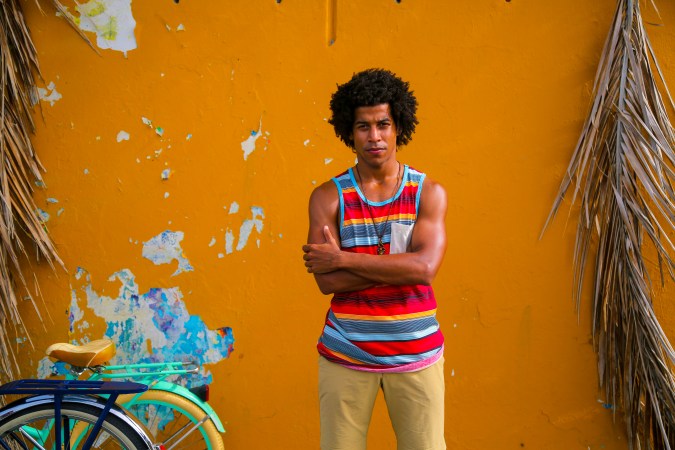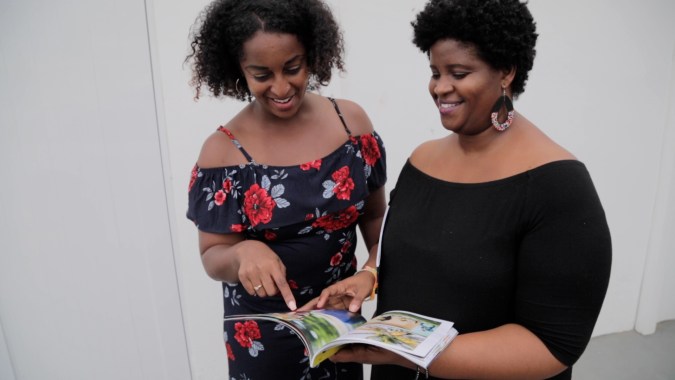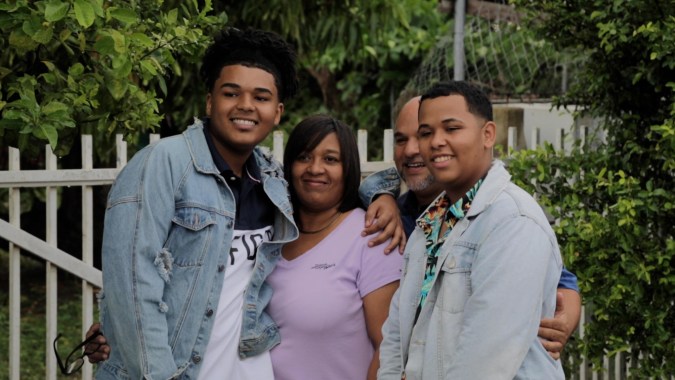In Afro-Latinx Revolution: Puerto Rico, journalist and host Natasha Alford grapples with questions about Black identity, systemic inequality and the enslavement of Africans across Latin America—queries that have whirled through her mind for decades.
Growing up in Syracuse, New York, in a mixed Puerto Rican and African-American home, Alford was raised celebrating her Blackness. But as she matured, she recognized that neither Latinx mainstream media nor society embraced the African lineage she had been taught to honor. Black skin rarely made it to the sofas of Spanish-language daytime syndicated talk shows, while Blackness was removed from most of the cultural and artistic productions of Afro-Latines.
Hoping to understand the way Latin America, and particularly her ancestral land of Borikén, wrestled with issues of race, identity, discrimination and protest, the now vice president of digital content and senior correspondent at TheGrio headed to Puerto Rico amid the summer 2019 uprising to investigate Black struggle within an archipelago-wide movement against colonialism.
“Blackness is not confined to an African-American space. Blackness exists across the world. I was yearning, hungry and craving more information about my own Boricua roots because I wasn’t getting it elsewhere,” Alford, who produced Afro-Latinx Revolution in partnership with the Pulitzer Center through a Crisis Reporting grant, tells Remezcla.
Blackness is not confined to an African-American space.
Weaving in her own story with the experiences and insight of Black Boricua scholars, historians, activists and cultural producers, Alford, along with Defend Puerto Rico producers Mikey Cordero and Frances Medina, share a story of cultural and political racial revolution in Puerto Rico and its connection to a pro-Black movement in the contiguous United States.
We spoke with Alford about the historic and ongoing struggle of Black Puerto Ricans on the archipelago, what she hoped to accomplish with the short film and why it’s critical for Latines and non-Latines alike to watch the documentary this Black History Month. Afro-Latinx Revolution is now streaming on theGrio, Amazon Prime, Local Now and YouTube.
This interview has been lightly edited and condensed for clarity.
Why did you want to share this story of Black identity, history and revolution in Puerto Rico?
There were so many threads of inspiration. Just from a journalist standpoint, when I saw what was happening with former Gov. Ricardo Rosselló in 2019 and the way the news was covering it, I felt like there was an overlooked story, and I’m always inspired by overlooked stories and the underdog. I like shaking up narratives. I think our conversation about Latinidad deserves some freshening up.
I didn’t come at this from an activist angle. I believe in the power of data and qualitative data to make change.
I work at an African-American news outlet, so I’m aware of the ways Blackness and Latinidad are presented as polar opposites. If there’s a poll, it shares Black and Latinx demographics. They are separated. I wanted to complicate that narrative, and stories speak for themselves. I didn’t come at this from an activist angle. I believe in the power of data and qualitative data to make change.
On a personal note, I know as a little girl when I was educated about Puerto Rican culture, I was always told the concept of three races: Black, Taino and Spaniards. But that was it. It didn’t go deeper than that. If I don’t live on the island, I may not have access to primary sources. Because I am multicultural, my father is African American, I had a sense of investment in understanding Blackness, and I want to understand it in every context. Blackness is not confined to an African-American space. Blackness exists across the world. I was yearning, hungry and craving more information about my own Boricua roots because I wasn’t getting it elsewhere. So, between the professional and personal motivations, going there and creating this just made sense to me.

This film is titled Afro-Latinx Revolution: Puerto Rico. You filmed this project amid the summer protests of 2019, and you focus on the municipality of Loíza, where many locals are literally the descendants of enslaved Africans who led a rebellion against Spanish colonizers. When you talk about a revolution taking place among Black Boricuas in Puerto Rico today, what does this look like?
Revolution is more than political action in the streets or protests. I think revolution happens in our minds, in our hearts and in the way we use language, so what I saw playing out, even before 2019, was a revolution in Black consciousness. It’s not that Afro-Latinidad is new. It’s not. But there is a new generation embracing, celebrating and creating media to celebrate Blackness and to educate people about their African roots. Social media has aided this. There is a wealth of information, but oftentimes it’s been isolated to certain communities and individuals. Now we’re finding people who didn’t have access to information learning about things they wished they’d always known. The revolution, for me, is one of hearts and minds.
Revolution happens in our minds, in our hearts and in the way we use language.
But, practically, I was looking at the coverage of the protests in Puerto Rico in 2019, and I wasn’t seeing Black organizers profiled in the pieces. I thought, just because they’re not profiled doesn’t mean they’re not there. I’m sure someone is organizing around anti-racism efforts. It has to exist even if it’s not front and center in coverage here. Part of the project was finding out how people were actively resisting. In the documentary, we meet Gloriann Sacha Antonetty Lebrón, an activist and journalist, as well as Marcos A. Rivera Ortis, a lawyer who is suited up and chooses to take the judicial route of holding people accountable, which is very hard in a culture that discourages taking people to court. This is all a part of the revolution.

You grew up in a Puerto Rican-African American home in Syracuse, New York. You’re part of the diaspora. I know Puerto Rican pride and culture were embedded in your upbringing, but I also know that these experiences often look very different than they do for Puerto Ricans on the archipelago. What’s something that you learned about being Afro-Latina from islanders that you hadn’t known or witnessed in the same way in New York?
I’m from Upstate New York, where it’s a little more segregated. It was tricky growing up there. People think of things in black and white. People don’t think of the intersections. I think there is something powerful about going to the source, standing on the beaches of Loíza where I know descendants of enslaved people built their own community, people who ran away and fought back. They preserved this heritage. You can ask them about things, about bomba, about the rhythm of music, and they can explain the history behind it. That’s powerful. There is something that is moving doing this on that sacred ground and seeing people have melanin.
The beauty of the culture is the diversity.
Popular depictions of Puerto Ricans, and Latinxs more broadly, don’t show Black Puerto Ricans. It’s always showing the same look, but the beauty of the culture is the diversity. It was just nice to be surrounded by Blackness and also to know there were sites with so much history.
What was the most inspiring moment you experienced or lesson you learned while working on this project?
This was a short trip. I pitched it and within a week I had to pack a bag and go down there. I was there only for a week, but there were so many inspiring moments. Every moment for me was so moving. Listening to stories, I was completely enthralled. I did a lot of listening. But my most memorable moment came from visiting Marcos Rivera at his law firm and seeing something he built on his own. Seeing a Black Puerto Rican man so successful almost brought me to tears. It’s crazy we don’t see this image projected everywhere. Instead, we always see Afro-Latinxs as side characters or extras, in the background, poor, struggling or criminal. It’s the same in the contiguous U.S. African Americans are confined to these stereotypes of victim and not victor. But here is a Black Puerto Rican man proud of where he comes from and his identity who is helping others on his own and through his family-run law firm.
It’s Black History Month. Would you say Afro-Latinx Revolution: Puerto Rico is an essential film to watch at a time when we observe the struggle, power and history of Black Americans?
Absolutely. One of the fathers of Black history is Arturo Alfonso Schomburg, a man of the Harlem Renaissance who played a huge role in the African-American community, and he was Puerto Rican. I want people to broaden their understanding of Black history and see the many ways Afro-Latinxs have been part of Black history in the contiguous U.S., and not just Puerto Ricans. Panamanians stood beside Dr. King. But they are erased and made invisible. The Latinx aspect of their identity gets erased because we think of things in black and white, and Latinidad is associated with whiteness or mestizaje. It helps to complicate this conversation, to show the struggle for racial justice and civil rights have parallels with the struggles happening around the world. Also, for better or for worse, Puerto Rico is part of the United States. It’s not just a place to vacation. We should be paying attention to what’s happening there, always.

What do you hope viewers, including both Boricuas and non-Puerto Rican Black communities, gain from this film?
I’m going to give the cliché film director response: I don’t want to tell people how to feel. However, I do want Afro-Latinxs to walk away feeling seen after watching this project, to feel like they have a piece of media content to point to that accurately surveys the issue. With that, I’m open to feedback. I can’t cover everything in 35 minutes. There’s no way. I hope it inspires more people to create media that policymakers pay attention to, media that helps create policy on the island about how they’re going to address questions of racial inequality.
I want Afro-Latinxs to walk away feeling seen after watching this project.
A huge part of the story is about being counted. If we are saying this is a racial utopia, then we’re not counting or attempting to address racial disparity. So I hope everyone sees this as a call to action within themselves.
Can we expect similar short documentaries centered on Blackness in different areas of Latin America and the Caribbean?
The revolution doesn’t just belong to Puerto Rico, so I do intend to do more projects on this topic. It’s just a matter of my schedule and funding, but the work is far from over and I’m also hoping that a whole new generation of storytellers come in and are motivated to go out and tell these stories, too.




